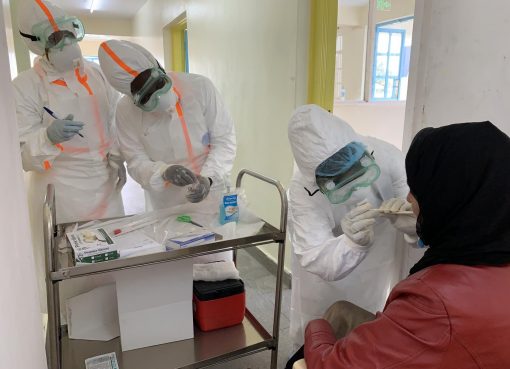The government’s plans to address water scarcity in Marsabit County is bearing fruits with a borehole yielding 23,000 m³ per hour having been drilled at Golole Location, Moyale constituency.
Also, every effort is being done to reinstate the Sh4.6 billion hunger safety net programme (HSNP) that stopped in eight arid and semi-arid Lands (ASALs) counties over funding about four months ago.
The Principal Secretary for ASALs and Regional Development Mr. Kello Harsama made the remarks when he officiated at the commissioning of the Golole borehole 3 water project that cost the government with the support of the European Union (EU) Sh15 million.
Harsama said the successful implementation of the project marked a significant step towards addressing the long-standing water shortage over 3000 residents of Golole Location, who are predominantly pastoralists have been facing.
The PS said the importance of reliable access to water could never be over emphasised because the achievement also goes a long way in improving the livelihoods of the local communities.
He added that the government through the National Drought Management Authority (NDMA) has put measures in place to ensure the sustainability of the project via capacity building and tree planting.
The function was also attended by the chairman of the National Drought Management Authority (NDMA) Board Mr. Shallow Yahya, NDMA CEO Lt. Col (Rtd) Haren Adan and Marsabit Deputy Governor Solomon Gubo.
The project that included drilling, installation of a 400-metre pipeline, construction of a 15-metre elevated steel water tower with two 10,000-litre tanks, is expected to offer a steady and reliable water supply to 500 households for both domestic use and livestock.
“This borehole’s capacity also supports up to 10,000 heads of livestock, which is a crucial livelihood resource for the local pastoralist communities in the region,” Harsama pointed out.
While extending gratitude to the EU and the various stakeholders who contributed to the project’s success, the PS noted that the facility was also expected to strengthen the resilience of the communities to climate change.
“It aligns with the National Government’s priorities for climate adaptation and resilience, which are essential for the sustainability of pastoralism in the ASAL regions,” he added.
NDMA Chief Executive Officer Lt. Col. (Rtd) Hared Adan underlined the importance of implementing community priority projects adding that the concluded water project was an urgent need that has been echoed through various forums.
“NDMA follows a participatory approach which enables communities to identify their challenges and to prioritise actions to address them,” he said, adding that the approach ensures interventions made by the authority addressed the most pressing needs of the community.
Adan called on partners to invest in long-term resilience building saying that there was need to reduce the vulnerability of communities in the face of increasingly frequent and severe droughts.
In addition to the Golole Water Project, the State Department for ASALs, through the NDMA, is implementing several other projects aimed at building resilience across Marsabit County.
These include the Missa Integrated Irrigation Project (Sh45 million), the Sirata Micro-Irrigation Project in Loglogo (Sh4.9 million), and a camel restocking initiative (Sh42 million) across all sub-counties.
The Principal Secretary further said the government continues to provide cash transfers through the Hunger Safety Net Programme and drought response through water trucking in drought-affected areas.
Mr Harsama emphasised the Government’s commitment to improving the livelihoods in ASAL community areas and that the HSNP that had payment issues in 8 counties that include Marsabit and Wajir would resume in a month’s time.
The PS said President William Ruto had assured of the resumption of payment to the programme beneficiaries and that the Sh4.6 billion required had been sourced from the National treasury.
“This is just one example of the many ways the Government is working to address the unique challenges faced by our communities in the ASAL regions,” said the PS.
The project also complements on-going initiatives, including multi-stakeholder, multi-institutional cross-border projects supporting Marsabit County and Southern Ethiopia being implemented by drought risk management partners such as Strategies for Northern development (SND).
Sololo sub-county DCC Edward Goko commended NDMA with funding from the European Union under the Dryland Climate Action for Community Resilience for prudent use of resources as the project was bound to transform the lives of locals in a big way.
Goko pointed out that water scarcity has been a source of conflict between communities especially during times of drought a situation expected to be addressed with the fruition of the Golole water project.
The improved water supply in Golole location, according to the DCC would also indirectly benefit neighbouring areas and trans-boundary pastoralist communities along the Kenya-Ethiopia border.
He said that apart from small scale irrigation farming as outlined in the project, increased livestock production and rehabilitation of dryland ecosystems will improve food security, nutrition and the general health for households.
By Sebastian Miriti




